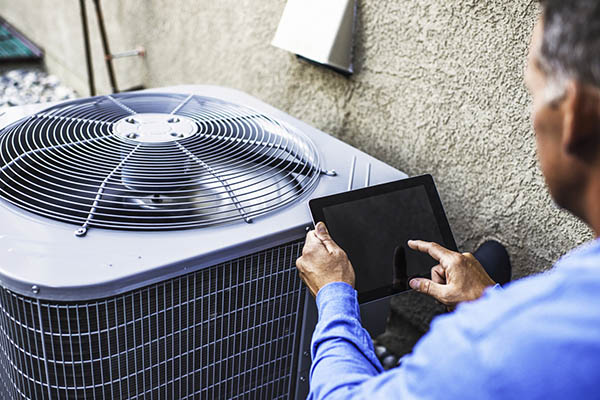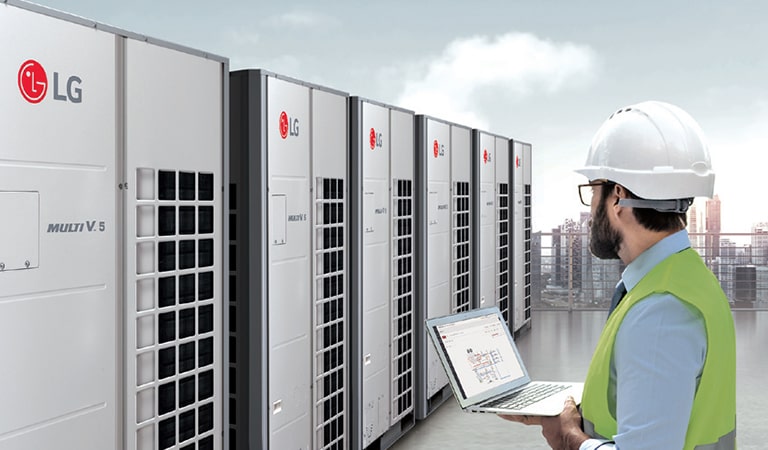Your First Steps with heat pump installation ooltewah tn
Your First Steps with heat pump installation ooltewah tn
Blog Article
How a Heatpump and Heater Interact to Enhance Your Home's Heating Performance
Comprehending exactly how a heatpump and heating system collaborate is essential for house owners seeking reliable heating solutions. Each system has its toughness, offering a well balanced strategy to home comfort. The heat pump stands out in modest temperature levels, while the heating system supplies rapid warmth throughout extreme cold. This harmony not just minimizes power expenses but additionally enhances the life expectancy of both devices. What elements influence this collaboration, and how can home owners maximize their advantages?
Recognizing Warm Pumps: How They Function
Several individuals might be unknown with their inner operations, heat pumps play an important function in modern-day home heating systems. These tools run by moving warmth from one area to an additional, using the concepts of thermodynamics. In colder months, a heatpump essences warm from the outside air, ground, or water, and transfers it inside to heat the home. Alternatively, during warmer months, it can reverse the process, acting as an a/c by eliminating warmth from inside to the outside.Heat pumps consist of an evaporator, expansion, compressor, and condenser valve. The cooling agent within the system soaks up warmth as it evaporates at low temperatures and pressures. The compressor then increases the pressure and temperature of the cooling agent, permitting it to launch warmth as it condenses. This reliable process can greatly reduce power intake contrasted to conventional heating techniques, making heatpump a sustainable selection for environment control in homes.
The Role of Heaters in Home Home Heating
Furnaces play a necessary function in home heating by offering a reliable resource of heat during the cooler months. They run by producing warmth through combustion or electric resistance, distributing it throughout the home using ducts or radiant systems. The effectiveness of a furnace is usually gauged by its Yearly Fuel Utilization Performance (AFUE) ranking, which indicates how efficiently the unit converts gas into heat.Furnaces can use numerous power sources, including gas, oil, lp, or electricity, enabling home owners to choose the most appropriate option for their demands. Unlike heatpump, which might have a hard time in extreme cool, heaters keep regular efficiency, ensuring that interior temperature levels stay comfy despite outdoor conditions. In addition, modern-day heating systems typically come geared up with innovative technology, such as smart thermostats and variable-speed blowers, boosting their efficiency and responsiveness. This adaptability makes heaters an important element in comprehensive home heating strategies.

Benefits of Using Both Solutions With Each Other
Incorporating the staminas of both furnaces and heatpump can lead to an extra reliable and efficient home heating remedy. Utilizing both systems permits house owners to make use of the heatpump's energy effectiveness during milder temperature levels while relying upon the heater for even more extreme cold conditions. This twin method can considerably minimize power expenses, as heat pumps eat much less electricity than traditional heating approaches when temperatures are moderate.Additionally, using both systems together can improve comfort levels in the home. Heat pumps can provide constant, even heating, while furnaces can rapidly raise ambient temperatures when needed. The integration of both systems can prolong the lifespan of equipment by lowering wear and tear on each device, as they share the workload. Ultimately, property owners can take pleasure in a well balanced, cost-efficient heating service that changes seamlessly to differing weather problems, ensuring a warm and welcoming home throughout the cold weather.
Exactly How Warmth Pumps and Furnaces Enhance Each Other
When home owners incorporate heatpump and heaters, they produce a complementary heating unit that maximizes performance and convenience. Warmth pumps operate by transferring heat from the outside air or ground, making them extremely reliable in moderate environments. They succeed during milder temperatures, providing cost-effective home heating. On the other hand, heating systems create warm via burning or electric resistance, providing solid, instant heat throughout extreme chilly conditions.The mix of these 2 systems permits for dynamic modifications based on temperature level fluctuations. During warmer months or milder winter season days, the warm pump can take the lead, saving energy and decreasing costs. As temperature levels drop, the heating system can effortlessly engage, guaranteeing regular warmth throughout the home. This synergy not just maximizes power use however additionally improves the life expectancy of both systems, as each device runs within its optimal performance array. With each other, they develop a well balanced environment that adapts to varying climate demands.
Optimizing Efficiency: Tips for Homeowners
House owners can enhance their heating effectiveness with several functional methods. Establishing a regular maintenance timetable, incorporating clever thermostat innovation, and applying effective insulation and securing solutions are key steps. These actions not only boost comfort yet additionally reduce power expenses.
Normal Maintenance Schedule
To ensure optimal home heating efficiency, establishing a routine upkeep timetable is crucial for any type of home. Property owners must prioritize regular inspections of both warm pumps and heaters to identify peak efficiency. This includes altering air filters each to 3 months, as blocked filters can considerably reduce performance. Additionally, scheduling expert upkeep a minimum of annually enables service technicians to recognize and address possible issues prior to they intensify. Property owners ought to likewise cleanse the heatpump's outdoor unit to stop debris buildup that can hinder air flow. By sticking to a normal maintenance routine, home owners not just enhance their heater' performance yet also prolong their lifespan, leading to greater comfort and decreased energy expenses throughout the colder months.
Smart Thermostat Combination
Incorporating a wise thermostat right into a home heating system can substantially improve power efficiency, specifically as it permits exact control over temperature level setups. These gadgets can learn the property owner's timetable and preferences, immediately changing the temperature to enhance comfort while lessening energy use. They can lower heating throughout times when the home is vacant, minimizing unneeded usage. Several wise thermostats also provide real-time energy use information, enabling property owners to make informed decisions about their home heating behaviors. Furthermore, remote gain access to through smartphone visit this page apps enables customers to readjust setups from anywhere, making certain the home is warm upon return. Overall, wise thermostat combination not just improves convenience however significantly contributes to energy financial savings and efficiency.
Insulation and Securing Solutions
Smart thermostats play a crucial role in power effectiveness, however their effectiveness can be considerably improved by proper insulation and sealing options. Homeowners need to focus on insulating floors, walls, and attics to decrease heat loss. High-quality insulation materials, such as spray foam or fiberglass, can significantly boost thermal resistance. Additionally, sealing gaps around windows, doors, and ducts prevents chilly air infiltration and warm getaway. Weatherstripping and caulking work approaches for addressing these leakages - heat pump service. Routine examinations for air leakages, along with the usage of blower door tests, can assist identify problem areas. By spending in insulation and sealing, property owners can enhance the performance of their furnace, ultimately causing lowered power usage and reduced utility bills
Usual Myths Concerning Warm Pumps and Furnaces
What false impressions border warmth pumps and heaters? Several people wrongly believe that heat pumps are inadequate in cooler environments. In fact, modern heat pumps are made to run successfully even in reduced temperature levels, offering trustworthy heating throughout wintertime. One more common misconception is that heating systems are always more reliable than heatpump. This depends on the particular power resources and effectiveness ratings of the systems in question. Some might likewise believe that using both systems all at once is unnecessary, however in fact, this combination can maximize heating performance, specifically throughout extreme weather. Additionally, individuals commonly assume that heatpump require consistent upkeep, when truthfully, they have comparable maintenance requires to conventional heater. By debunking these misconceptions, property owners can make even more enlightened decisions concerning their heating options, eventually bring about enhanced convenience and power performance in their homes.
Maintenance Considerations for Combined Equipments

Frequently Asked Questions
Can Warmth Pumps Job Efficiently in Exceptionally Cold Climates?
Heatpump can struggle in very cool climates due to minimized efficiency and warm removal constraints. However, innovations in modern technology have caused versions made for far better efficiency in such conditions, improving their feasibility in harsh atmospheres.
How Much Time Do Heat Pumps and Furnaces Typically Last?
Warm pumps normally last 15 to two decades, while heaters have a lifespan of 15 to 30 years. Normal maintenance can prolong their durability, guaranteeing effective operation and decreasing the need for early substitutes.

What Is the Average Price of Setting Up Both Systems?
The typical price of setting up both a heatpump and a heating system generally varies between $5,000 to $10,000 - heat pump replacement ooltewah tn. Factors influencing this cost include system dimension, installation complexity, and local labor rates
Exist Tax Motivations for Using Energy-Efficient Home Heating Solutions?
Many home owners ask about tax obligation incentives for energy-efficient home heating systems. Various federal and state programs usually provide discounts or credit reports, urging the adoption of sustainable technologies to decrease energy consumption and promote environmental duty.
How Do I Choose the Right Dimension Warmth Pump and Heater?
Selecting the right size heat pump and heating system click this involves calculating the home's square video footage, thinking about insulation top quality, and evaluating neighborhood climate. Consulting an expert can guarantee optimal system performance and energy effectiveness based on particular needs. furnace replacement. Understanding how a heat pump and heater job with each other is essential for home owners looking for reliable heating solutions. In cooler months, a warm pump essences heat from the outdoors air, ground, or water, and transfers it inside to warm up the living area. When house owners integrate heat pumps and furnaces, they develop a complementary heating system that makes best use of effectiveness and comfort. Heat pumps run by moving heat from the outdoors air or ground, making them highly efficient in moderate environments. Heat pumps can struggle in incredibly cold climates due to decreased efficiency and warmth removal limitations
Report this page